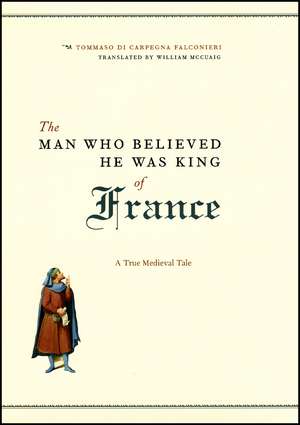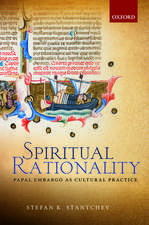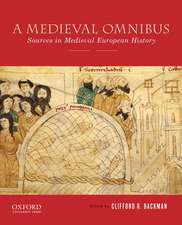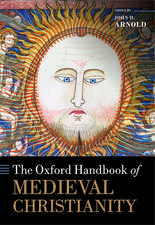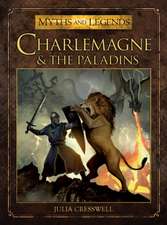The Man Who Believed He Was King of France: A True Medieval Tale
Autor Tommaso di Carpegna Falconieri Traducere de William McCuaigen Limba Engleză Hardback – 15 sep 2008
Replete with shady merchants, scoundrels, hungry mercenaries, scheming nobles, and maneuvering cardinals, The Man Who Believed He Was King of France proves the adage that truth is often stranger than fiction—or at least as entertaining. The setting of this improbable but beguiling tale is 1354 and the Hundred Years’ War being waged for control of France. Seeing an opportunity for political and material gain, the demagogic dictator of Rome tells Giannino di Guccio that he is in fact the lost heir to Louis X, allegedly switched at birth with the son of a Tuscan merchant. Once convinced of his birthright, Giannino claims for himself the name Jean I, king of France, and sets out on a brave—if ultimately ruinous—quest that leads him across Europe to prove his identity.
With the skill of a crime scene detective, Tommaso di Carpegna Falconieri digs up evidence in the historical record to follow the story of a life so incredible that it was long considered a literary invention of the Italian Renaissance. From Italy to Hungry, then through Germany and France, the would-be king’s unique combination of guile and earnestness seems to command the aid of lords and soldiers, the indulgence of inn-keepers and merchants, and the collusion of priests and rogues along the way. The apparent absurdity of the tale allows Carpegna Falconieri to analyze late-medieval society, exploring questions of essence and appearance, being and belief, at a time when the divine right of kings confronted the rise of mercantile culture. Giannino’s life represents a moment in which truth, lies, history, and memory combine to make us wonder where reality leaves off and fiction begins.
Preț: 275.19 lei
Nou
Puncte Express: 413
Preț estimativ în valută:
52.67€ • 57.24$ • 44.27£
52.67€ • 57.24$ • 44.27£
Carte tipărită la comandă
Livrare economică 21 aprilie-05 mai
Preluare comenzi: 021 569.72.76
Specificații
ISBN-13: 9780226145259
ISBN-10: 0226145255
Pagini: 224
Ilustrații: 1 map, 2 line drawings, 1 table
Dimensiuni: 140 x 216 x 25 mm
Greutate: 0.4 kg
Editura: University of Chicago Press
Colecția University of Chicago Press
ISBN-10: 0226145255
Pagini: 224
Ilustrații: 1 map, 2 line drawings, 1 table
Dimensiuni: 140 x 216 x 25 mm
Greutate: 0.4 kg
Editura: University of Chicago Press
Colecția University of Chicago Press
Notă biografică
Tommaso di Carpegna Falconieri is director of studies in medieval history at the University of Urbino and head of courses in methodology of historical research and the history of the Middle Ages.
William McCuaig has translated more than a dozen books from Italian and French, including Chiara Frugoni’s A Day in a Medieval City, also published by the University of Chicago Press.
William McCuaig has translated more than a dozen books from Italian and French, including Chiara Frugoni’s A Day in a Medieval City, also published by the University of Chicago Press.
Cuprins
Preface (2005)
Preface to the American Edition (2008)
Translator's Note
Map of Europe in 1360
Chapter 1. AT ROME
Chapter 2. AT SIENA
Chapter 3. IN THE EAST
Chapter 4. IN THE WEST
Chapter 5. IN PRISON
Chapter 6. GIANNINO IN HISTORY, LEGEND, AND LITERATURE
Appendix 1: THE DIRECT CAPETIAN LINE
Appendix 2: THE ANGEVINS OF NAPLES AND HUNGARY
Notes
Bibliography
Index
Preface to the American Edition (2008)
Translator's Note
Map of Europe in 1360
Chapter 1. AT ROME
Chapter 2. AT SIENA
Chapter 3. IN THE EAST
Chapter 4. IN THE WEST
Chapter 5. IN PRISON
Chapter 6. GIANNINO IN HISTORY, LEGEND, AND LITERATURE
Appendix 1: THE DIRECT CAPETIAN LINE
Appendix 2: THE ANGEVINS OF NAPLES AND HUNGARY
Notes
Bibliography
Index
Recenzii
“Falconieri painstakingly pieces together the events surrounding his hero’s doomed bid in a narrative that reads like an adventure story.”
“In this mostly elegant, sometimes workmanlike, study—part detective story and part history—University of Urbino medievalist Falconieri raises significant questions about the tale. Was Giannino a historical figure or a literary invention? Was he really the royal child switched at birth by a wet nurse intent on saving her marriage? Through an examination of other similar medieval tales and contemporary works that discuss such stories (e.g., Dante’s Commedia), Falconieri answers these questions while offering fascinating glimpses into the intrigues of the medieval French and Italian courts and the weaving of classical Greek and biblical tales into medieval stories about the revelation of royal identity.”
“Carpegna Falconieri unleashes his critical skills as a historian to situate Giannino, debate the authorship of the Istoria, and examine the role of fabricated identity in Giannino’s campaign to be recognized as king. Written in an accessible and captivating style—McCuaig also ably translated Chiara Frugoni’s A Day in a Medieval City—this well-researched work is recommended for academic and large public libraries.”
“I read The Man Who Believed He Was King of France with great pleasure. From the wonderful first sentence, it is a fascinating story and an engaging read. Unlike an Agatha Christie mystery, where all is revealed in the end, Carpegna Falconieri emphasizes the knots and twists of the skein of the tale, and we are as wrapped in it at the end as we were at the beginning.”
“The life of Giannino di Guccio, a.k.a King Jean I of France, unfolded from an infancy in France to the streets of Siena, to the Hungarian court at Visigrád, to the palace of the popes in Avignon, and finally to the prisons of Naples, against a backdrop of war, plague, dynastic intrigue, and millenarian hopes that defined the fourteenth century. Tommaso di Carpegna Falconieri employs his deep knowledge of medieval Italy, his skills as a historian, and his flair for storytelling to lead the reader through a maze of forgeries, impersonators, con artists, dreams, and schemes that raise fundamental questions about belief, identity, and destiny at once rooted in this vanished world and yet timeless.”
“An incredible tale of changelings, revolutionaries, political intrigue, and middle-class rectitude told with evenhanded compassion and a profound sense of history. Real life has never so resembled a picaresque novel, or a story from Boccaccio.”
"A fascinating and fun historical read, a book that enlightens as much on medieval politics and ideas of kingship as it does on the perhaps naive, perhaps opportunistic merchant at the middle of one of the more unusual—and certainly audacious—scams in recorded history."
